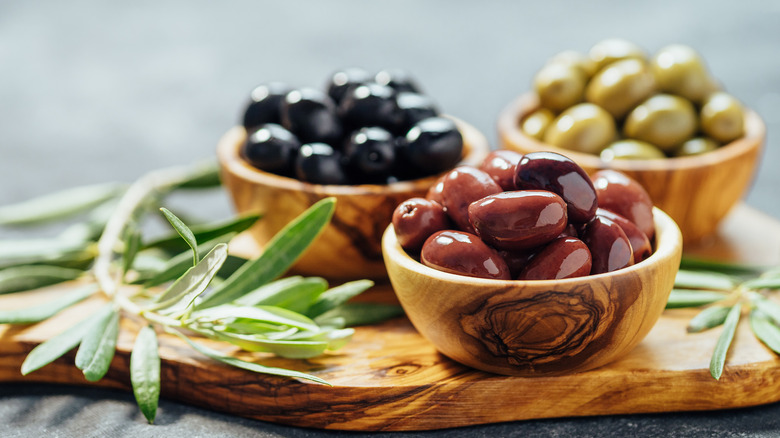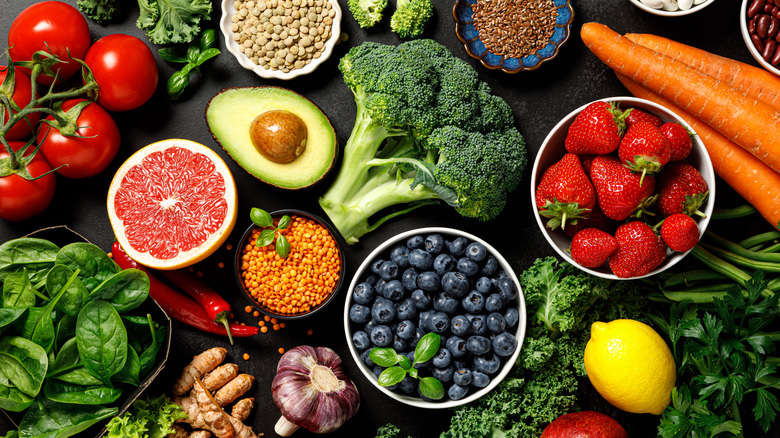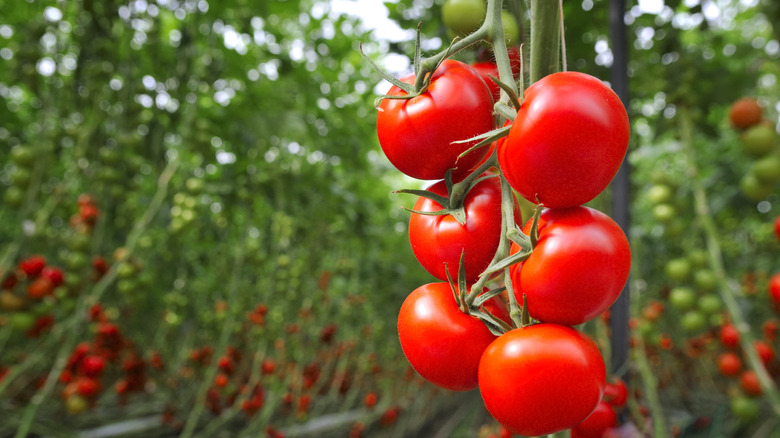We Finally Know Whether Olives Are Actually Fruits Or Vegetables
When enjoying tapenade, olives on your pizza, or drizzling olive oil on your salad, you probably aren't thinking about whether olives are a vegetable or fruit. Since olives are naturally bitter-tasting, it seems obvious that they are vegetables. Or is it? It's official, olives are the fruit of the Olea Europaea tree. They are more specifically a stone fruit, or drupe, like cherries, apricots, or peaches. The stone refers to the proportionately large seed in the middle.
Chances are you wouldn't pick an olive off the tree and eat it like you would an apple. Unprocessed olives are extremely bitter due to a substance called oleuropein. Even birds swallow uncured wild green olives whole to avoid tasting the bitterness. Humans cure olives with brine, water, or using other techniques to get rid of some of the natural bitterness. Most cultivated olives are pressed into olive oil. This has been the case for thousands of years, evidence suggests people started processing and eating wild olives as much as 100,000 years ago and farming olive trees for at least 6,000 years, according to the Olive Oil Times. Given their bitterness and the fact we always eat them cured (or pressed into oil), it's easy to understand why most people don't think of olives as fruit. You really have to delve into what makes something a fruit for more insight.
The difference between fruits and vegetables
Part of the confusion here stems from the different definitions of fruits and vegetables that exist in the botanical and nutritional worlds. While many people think of savory plant-based foods as vegetables and sweet plants as fruits, this definition doesn't hold true in the botanical field. Fruit serves a reproductive function; it is basically the plant's mature ovary holding the seeds. Fruits are often sweet and colorful since this helps motivate birds, insects, and mammals to eat the pulp while accidentally distributing the seeds. It's a similar tactic plants use with fragrant, colorful flowers to inspire pollinators like bees to aid in the plant's reproduction. This is nature's clever marketing strategy, but it's the reproductive function — not the sweetness — that makes something a fruit; so you can (and often do) find savory fruits.
To further complicate things, in the botanical world 'vegetable' is a pretty broad term; in fact, any plant-based food or product is a vegetable. As such, fruits and herbs fall under the umbrella of vegetables, technically. Practically speaking though, when talking about food and nutrition, we need more of a distinction between fruits, herbs, and vegetables since they serve different purposes in our diet. The New York Botanical Garden explains that nutritionally, 'vegetable' generally refers to the savory, nutritious, edible parts of a plant, including roots, leaves, stalks, or buds; while the term fruit is reserved for those sweet, colorful parts that are usually plucked from the plant. In addition to olives, there are plenty of savory fruits — tomatoes and avocadoes, for example – that we often think of as vegetables, nutritionally speaking.
Other vegetables that are really fruit
If you enjoy olives on your pizza, you may be interested in learning how another pizza "vegetable" got embroiled in legal controversy over whether it is a fruit. The case even found its way to the U.S. Supreme Court in the case Nix v. Hedden in 1893. The judges considered whether tomatoes are legally a fruit or vegetable. At the time, imported vegetables were taxed extra, while imported fruit were not. After some debate, the judges decided tomatoes are vegetables in common language because of how people eat and prepare them. Botanists would disagree since tomatoes function as reproductive bodies for the plant. Both Tennessee and Ohio still disagree, even going as far as naming the tomato as their state fruits.
Other fruits commonly considered vegetables include avocados, bell peppers, eggplant, and pumpkins. Nuts, including pecans, acorns, and walnuts, are also fruits. When you consider that many spices and seasonings like vanilla bean, capers, dried chillis, or nutmeg are also fruit, we eat unrecognized fruit every day. With this in mind, it isn't so surprising that olives are also fruit.


